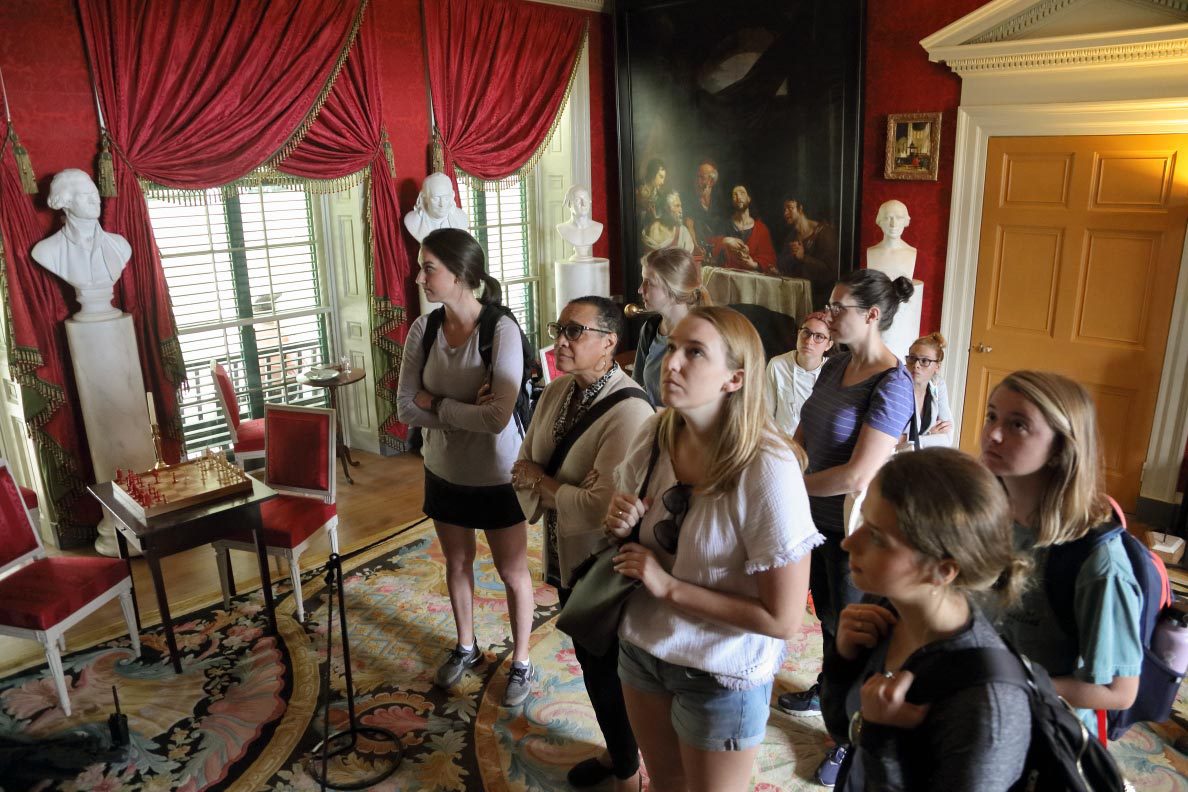On Saturday morning, 22 University of Virginia students boarded a bus outside the Curry School of Education and Human Development and made the winding, 45-minute drive to Montpelier, home of Founding Father James Madison, America’s fourth president.
Over the next several hours, they peered through the windows at the lawn where Madison’s wife, Dolley, once game him piggy-back rides through the grass. They walked across period-style Venetian carpets to the library where Madison drafted an early version of the Bill of Rights. They stood in the small room where, bedridden in his final years but sharp as ever, Madison would insist on opening the doors to the dining room so he could join in conversation with visitors.
Then, standing in the same room, they learned about the life of Paul Jennings – a man born into slavery at Montpelier who would eventually publish his own memoir. They listened to the voice of Rebecca Gilmore-Coleman, a descendant of the enslaved community at Montpelier, discuss the legacies of slavery in contemporary society. They discussed how James Madison, who helped enshrine freedom in the American constitution, never freed a slave.
Through real, human stories, past and present, they learned about the history that is recorded and the history that is lost – and, perhaps most important, the history that is still being uncovered.
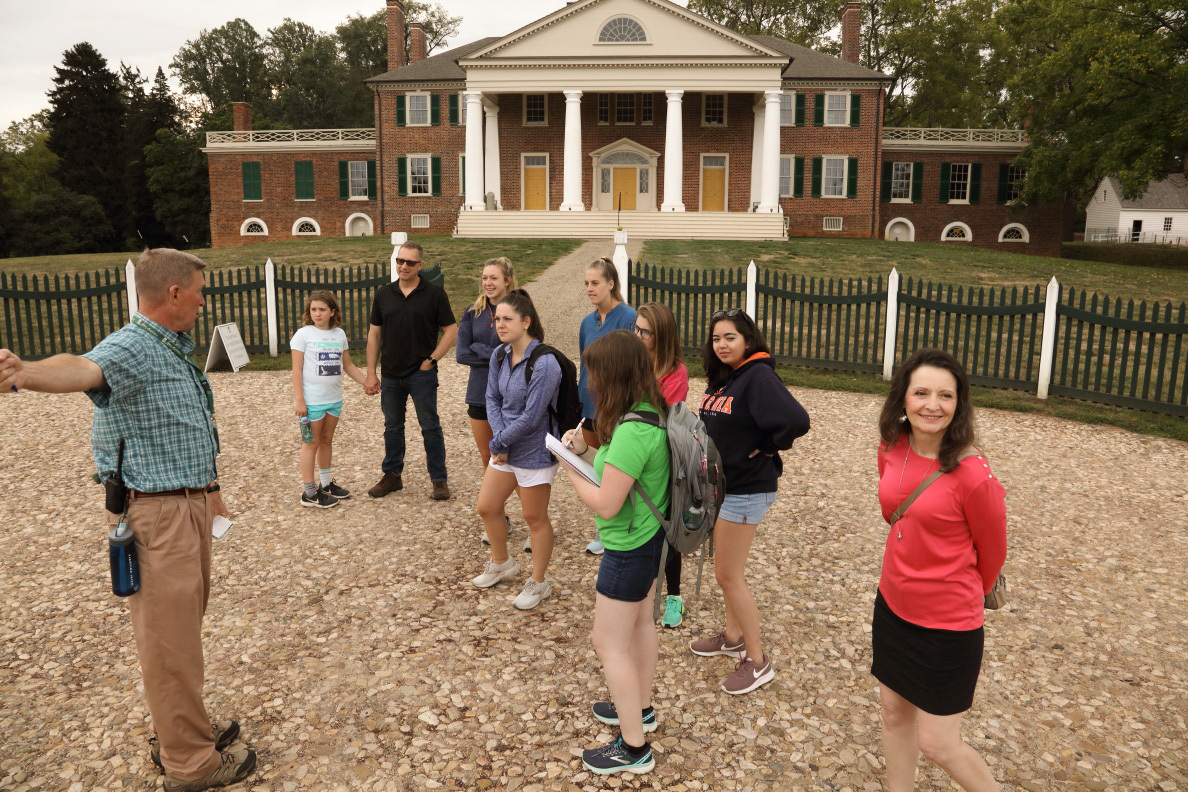
As part of a course on teaching social studies in elementary school, a group of Curry School master's students begins their tour of James and Dolley Madison’s plantation home.
Place-Based Education
The visit was part of a master’s-level course on “Teaching Social Studies in the Elementary School.” In the morning, students split into small groups and cycled through guided tours of the main house, the cellars and the south yard, which houses a reconstruction of former slave quarters. They discussed the Constitution, toured multimedia exhibits on the economics of slavery, and listened as guides explained how they compared archaeological evidence with family history and property records to uncover the site’s hidden past.
After lunch, the group gathered in the Claude Moore Educational Center for a debrief and discussion. Throughout the rest of the semester, students will draw on the shared experience as they complete assignments that include building a teaching portfolio and writing lesson plans on civics and American history.
The experience was all designed by associate professor Patrice Preston Grimes, whose research focuses on the history of African American education in the American South, as well as how that history can inform current educational policy and practice. Grimes is also associate dean for the Office of African American Affairs and served on the President’s Commission on Slavery and the University. She is a lifelong advocate for place-based education: the value of learning through experience.
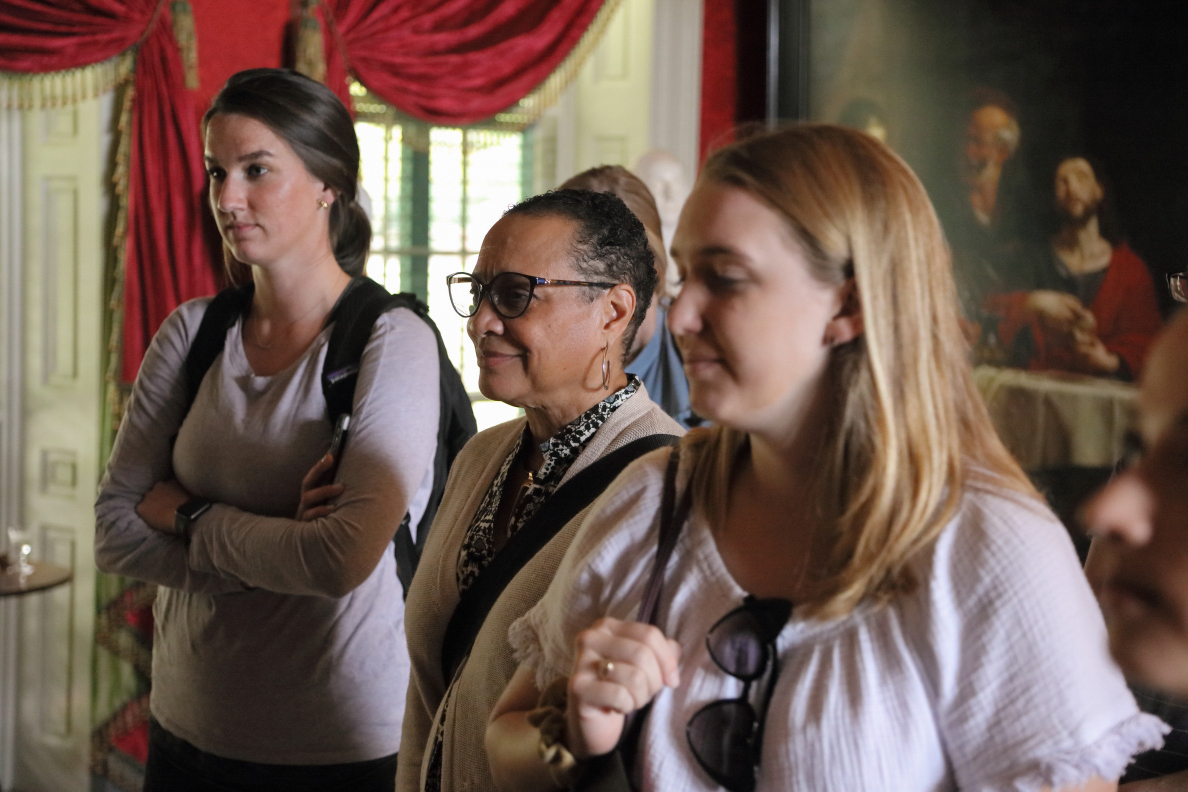
Grimes, center, a former social studies teacher, is a leading advocate for place-based education. She is scheduled to present at a national conference for social studies educators in November.
“There is something about being in the actual spaces,” said Price Thomas, director of marketing and communications for the Montpelier Foundation. “The stories become more salient when you can experience how small the rooms were, or how far families had to walk to see each other. You can’t get that from a book. You can’t get it from a podcast.”
Place-based education, however, is about more than the physical experience.
“Today, teaching students in diverse classrooms can be a challenge,” Grimes said. “One of the challenges is understanding students of different races, cultures and classes. For understanding black students in particular, it is important for teachers to have an understanding of themselves as well as the students they teach.”
Grimes designed the visit in part to help students develop their own sense of cultural identity. “It’s helping them tap into empathy and self-identity. The knowledge and understanding that they develop deepens their ability to be … more authentic teachers.”
At several points during the visit, students reflected on what they learned about slavery in school. Lillian Meggs, a first-year graduate student who grew up in Albemarle County, recalled discussing slavery as it related to the Civil War, but not much beyond emancipation.
“I think it’s important to go past that – to dig a little deeper,” she said. “Definitely what I learned today will help me in the future to dig deeper for my students.”
A Growing Field of Research
Grimes, a former social studies teacher, loves to travel and encourages all of her students to study abroad. She attributes her adventurous nature to early experiences as a Girl Scout that pushed her out of her comfort zone.
“As a teacher, researcher and educator, I have always believed in field experiences and place-based experiences,” she said. “Getting outside the classroom and helping students learn to act in their immediate community and world has always been a fundamental premise of how I want to teach.”
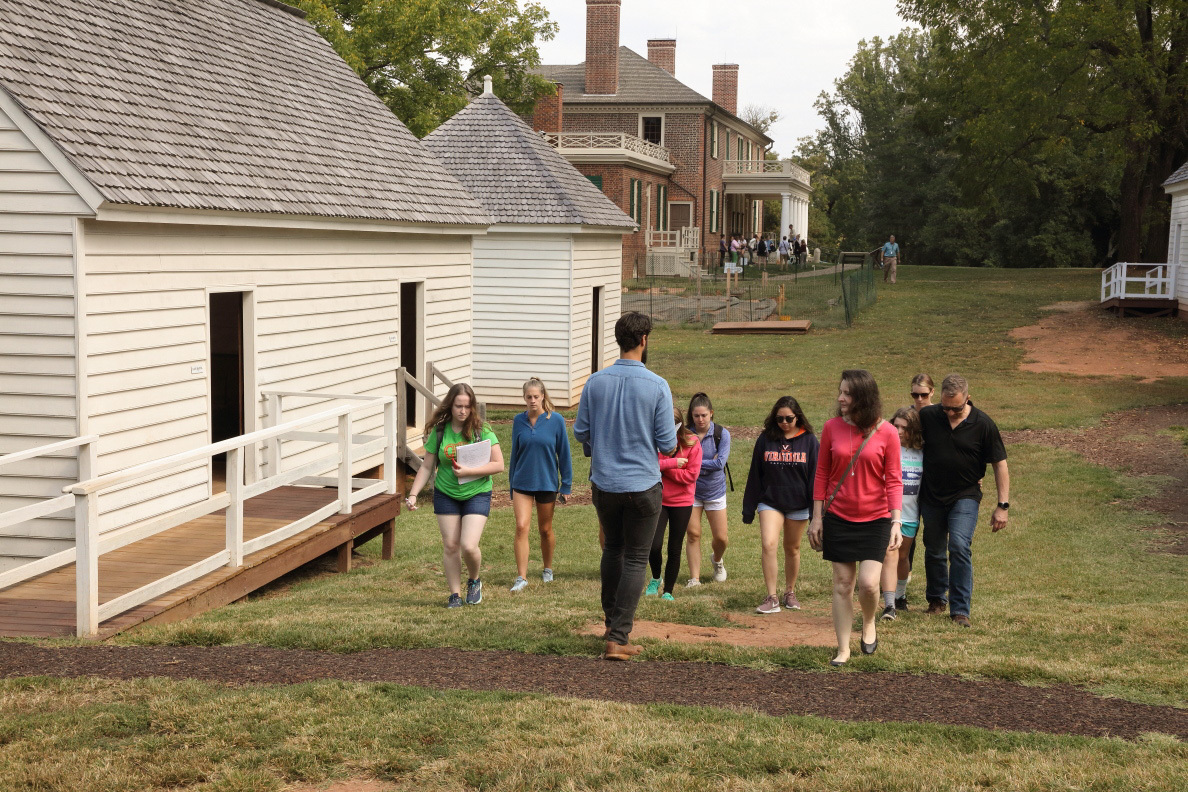
Christopher Pasch, archaeology crew chief at Montpelier, leads a group through a tour of the reconstructed slave quarters in Montpelier’s South Lawn.
With the growing pressures of standardized testing, however, resources for field experiences have diminished. Nevertheless, Grimes has been teaching her master’s students a version of the “Social Studies in Action” assignment for years. She’s led them on many trips to local sites like Montpelier and Charlottesville’s Daughters of Zion Cemetery, publishing research about place-based education along the way.
This year, thanks to a grant from UVA’s Center for Teaching Excellence, Grimes was able to organize the full-day visit for the entire class.
“It’s been really satisfying over my career to take an idea I’ve always believed in and have it build and grow to be able to do it with all of my students,” she said.
At the same time, a growing body of evidence-based, empirical research on place-based education is taking off nationwide. Grimes’s work also contributes to an ongoing interdisciplinary initiative across the Curry School to support teachers everywhere with research-based approaches to increase racial, religious and ethnic inclusion.
By modeling experiential learning for future teachers, the Montpelier experience is an ideal case study, Grimes said. She is already working on a new paper and is scheduled to present at the annual conference for the National Council of the Social Studies in November.
A Community Partnership
Montpelier, of course, provides a uniquely valuable resource. Saturday’s visit is the latest example of an ongoing collaboration between UVA and Montpelier, in which Grimes has been a leader.
“Montpelier was one of the first to examine the humanity and the daily lives of the enslaved community with equal representation,” Grimes said. She said the site was a trailblazer in actively engaging the descendants of its enslaved population to create “A Mere Distinction of Colour,” the award-winning slavery exhibition that opened in 2017. Descendants remain central to the existing exhibits as well as the ongoing work.
“Like it or not, the story of slavery is built into our American DNA,” Thomas said. “The Constitution that we talk about was a product of men who were slaveholders. There’s a duality to this historical narrative that it’s important that we tell. It’s important because it’s the truth, and it’s important because everyone has a part in this American story.”
Education – particularly through on-site experiences – is a core part of the foundation’s mission. Montpelier regularly hosts groups of students and teachers for tours and workshops and holds an annual archaeological dig just for teachers. In 2018, Grimes was among a group of leading educators, curators, activists and descendants who convened at Montpelier for a National Summit on Teaching Slavery.
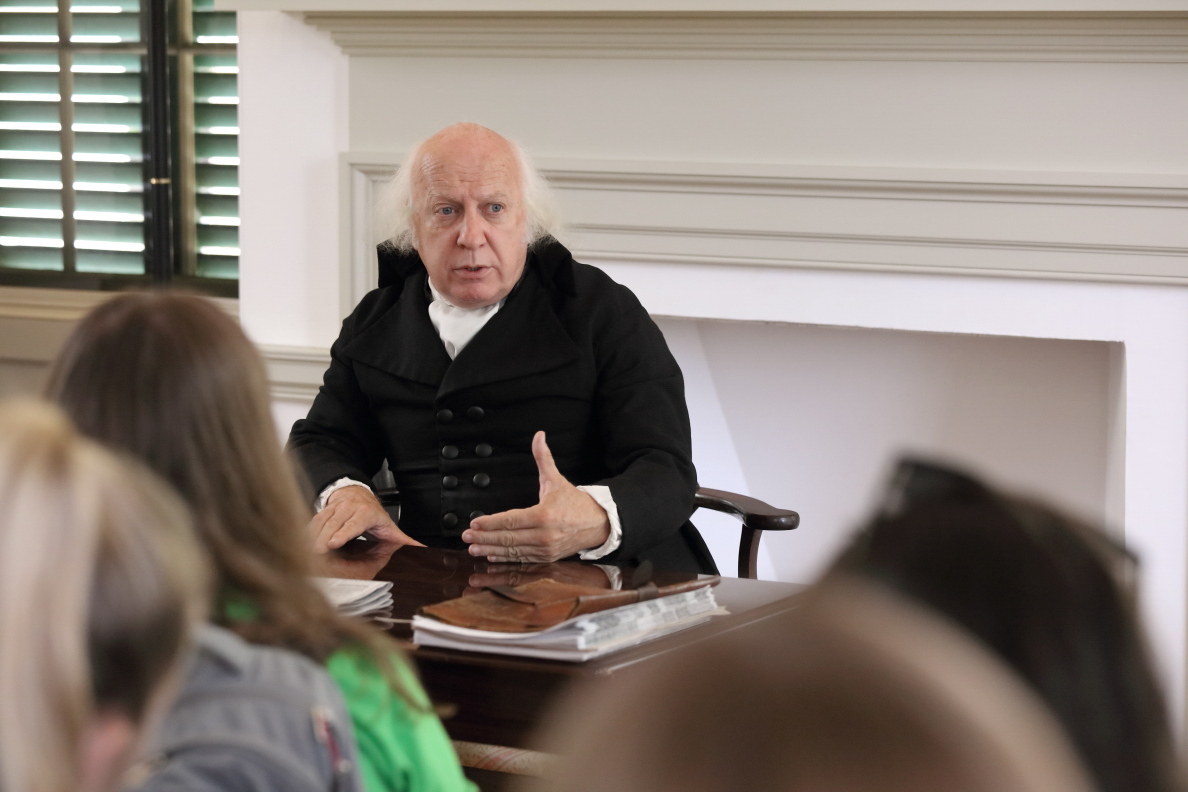
During their tour of the Montpelier house and grounds, students had the opportunity to visit with "Mr. Madison" himself.
The way they see it, Thomas said, Montpelier has a responsibility to be more than a monument to the past. Being a credible, authentic resource for school systems requires building partnership with the University and the local school systems. It also requires honesty – about the past itself, as well as its implications on the present.
“How do we make all of this information useful, accessible and actionable? And how do we contextualize it today?” By continually asking these questions, Thomas said, and working to tell the individual human stories behind every artifact, their goal is to bring the multi-layered identity of Montpelier’s residents to life.
For Grimes, this work of engaging with the past – in all its complexity – is the only way to keep the great American experiment alive in the future.
“I believe it is fundamental to our democracy and a healthy citizenry that students study the social sciences and humanities,” she said. “Not only the content, but the skills and attitudes and dispositions that they develop.”
Media Contact
Article Information
October 2, 2019
/content/power-place-future-social-studies-teachers-learn-montpelier

